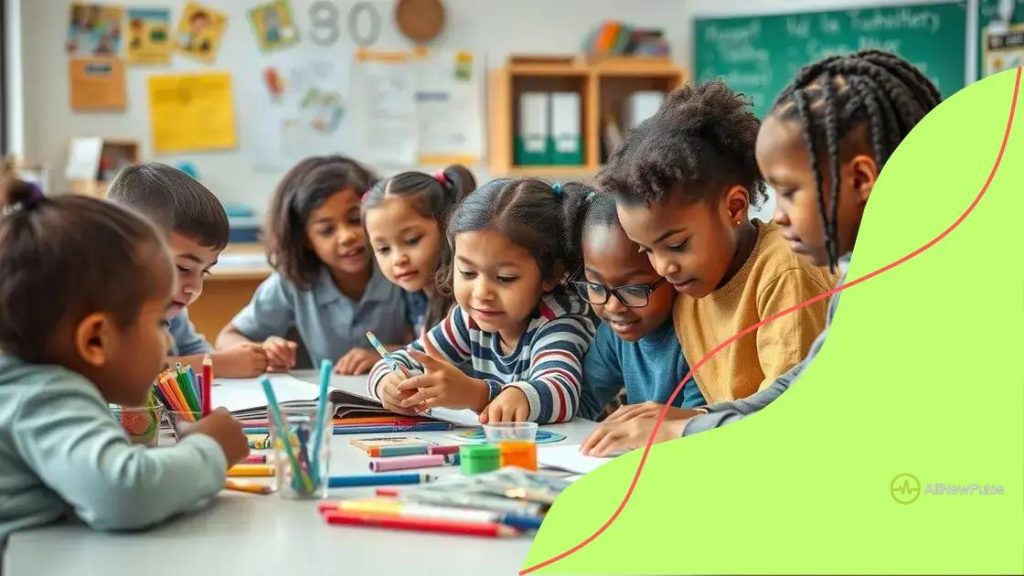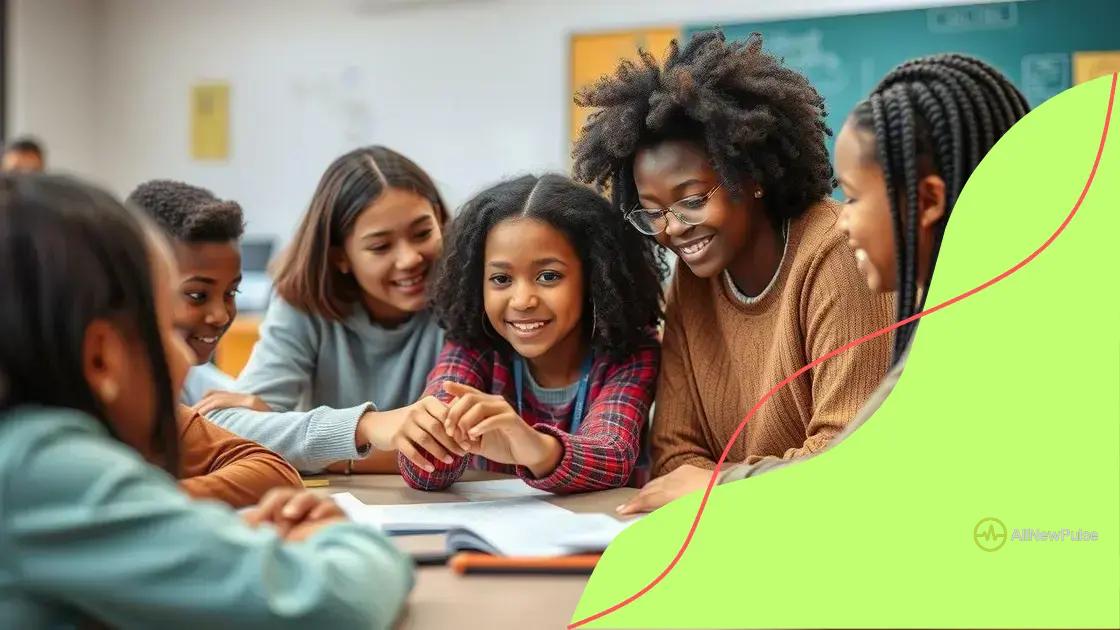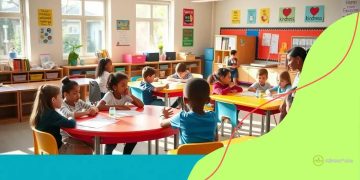Support strategies for gifted and talented students

Support strategies for gifted and talented students include tailored curricula, engaging extracurricular activities, and strong support networks to enhance their educational experiences and foster their growth.
Support strategies for gifted and talented students can significantly change how they experience education. Have you ever wondered how unique teaching methods can unleash their full potential? In this article, let’s explore effective strategies that educators and parents can apply.
Understanding the unique needs of gifted students
Understanding the unique needs of gifted students is essential for fostering their academic and emotional growth. These students often exhibit advanced abilities in specific areas, leading to a different learning pace compared to their peers. Recognizing these differences can help create a supportive learning environment.
The Characteristics of Gifted Students
Gifted students may display various traits that set them apart. They often have:
- Exceptional memory: Ability to retain information easily.
- High levels of curiosity: A strong desire to learn and explore new concepts.
- Creative thinking: An ability to think outside the box and generate innovative solutions.
These characteristics highlight the necessity to tailor educational strategies that meet their distinct needs. Many gifted students become bored or frustrated in traditional classrooms, leading to disengagement. It’s crucial to challenge them appropriately.
Providing Support
Acknowledging their individual needs is only the first step. It’s vital to implement strategies that support their learning journey effectively. Strategies can include:
- Differentiated instruction: Adjusting lessons to suit different learning styles and levels of understanding.
- Acceleration options: Allowing students to move quickly through subjects they have mastered.
- Enrichment opportunities: Offering advanced coursework or projects that delve deeper into subjects of interest.
By providing tailored educational experiences, we can help cultivate their talents and potential. The goal is not just to challenge them academically but also to nurture their social and emotional well-being.
Social interactions play a significant role in a gifted student’s life. They might feel isolated if they are not surrounded by like-minded peers. Hence, establishing peer groups is paramount. These groups offer emotional support and foster friendships.
Ultimately, working collaboratively with parents and educators can lead to a more enriching environment for gifted students. By focusing on their specific needs and fostering strong communication, we can ensure their growth and success in all areas of life.
Tailoring curriculum for advanced learners
Tailoring the curriculum for advanced learners is essential to meet their unique educational needs. These students thrive when the material is challenging and engaging. A customized approach can make a significant difference in their educational experience.
Strategies for Tailored Curriculum
To effectively tailor curriculum, educators can use various strategies that align with the interests and abilities of advanced learners. Some key methods include:
- Differentiated instruction: Adapting lessons to cater to different skill levels and preferred learning styles.
- Flexible grouping: Organizing students in different configurations for various activities, fostering collaboration and peer learning.
- Project-based learning: Encouraging students to engage in projects that align with their interests, allowing for deeper exploration of subjects.
Implementing these strategies can support gifted students in achieving their full potential. Advanced learners often require a deeper understanding of concepts, which can be facilitated through challenging assignments and enrichment activities.
Integrating Technology
Another effective way to tailor the curriculum is through the use of technology. Digital tools can provide personalized learning experiences. Using educational software and online resources allows students to learn at their own pace. For instance, adaptive learning platforms can assess student progress and adjust the material accordingly.
Additionally, incorporating hands-on activities and real-world applications can further enhance learning. When students can relate their studies to real-life scenarios, they often become more engaged. This not only maintains their interest but also fosters critical thinking and problem-solving skills.
Furthermore, providing opportunities for independent study can be beneficial. Advanced learners often enjoy exploring topics beyond the standard curriculum. Allowing them the freedom to pursue individual projects can ignite their passion for learning and encourage self-directed growth.
Ultimately, by ensuring that the curriculum is tailored to meet the needs of advanced learners, educators can create a more dynamic and fulfilling educational experience. With the right strategies in place, these students can thrive and develop a lifelong love for learning.
Creating inclusive classroom environments

Creating inclusive classroom environments is vital for supporting all learners, especially those who are gifted and talented. An inclusive setting allows advanced learners to thrive by encouraging collaboration and respect among students of all abilities. This approach fosters a sense of belonging and helps enhance their educational experience.
Strategies for Inclusion
To build an inclusive environment, educators can implement several effective strategies. These methods ensure that every student feels valued and can participate fully. Key strategies include:
- Flexible seating arrangements: Configuring the classroom to promote teamwork and interaction among students.
- Diverse learning materials: Providing a variety of resources that reflect different cultures and perspectives.
- Positive reinforcement: Encouraging positive behavior and celebrating student achievements, which can boost confidence.
These strategies create a welcoming atmosphere that allows advanced learners to engage with their classmates while feeling comfortable in expressing themselves.
Encouraging Collaboration
Collaboration among students is another essential aspect of an inclusive classroom. Pairing gifted students with classmates who have different strengths can enhance learning for everyone. When they work together, students can share their unique skills and talents. This not only supports their social-emotional growth but also promotes a deeper understanding of various subjects.
Teachers can facilitate collaboration by assigning group projects where each member contributes their strengths. This setting allows gifted students to take on leadership roles while also learning to appreciate the contributions of their peers. Establishing clear guidelines and goals for group work can help keep everyone focused.
Building a community within the classroom is crucial. When students feel connected, they are more likely to participate actively and support one another. Activities like team-building games or class discussions can strengthen these bonds and make the classroom feel like a safe place for expression.
Moreover, fostering a culture of respect and empathy is important. Encouraging students to listen to one another and appreciate different viewpoints can lead to more meaningful interactions. Workshops or discussions on empathy can help students understand the value of diverse perspectives in their learning journey.
Ultimately, creating an inclusive classroom environment helps all students, particularly gifted and talented learners, feel empowered and engaged in their education. With the right strategies in place, teachers can create spaces where every student can thrive.
Engaging extracurricular activities
Engaging extracurricular activities can play a significant role in the development of gifted and talented students. These activities provide opportunities for advanced learners to explore their interests outside the traditional academic setting. By participating in various programs, students can enhance their skills and discover new passions.
Choosing the Right Activities
When selecting extracurricular activities, it’s important to consider the interests and strengths of gifted students. Some popular options may include:
- Science clubs: These clubs offer hands-on experiments and projects that challenge analytical thinking.
- Debate teams: Participating in debates helps students develop strong communication and critical thinking skills.
- Creative arts programs: Engaging in arts such as theater, music, or painting can foster creativity and self-expression.
Allowing students the freedom to choose activities that excite them can lead to greater motivation and commitment. When students are passionate about what they are doing, they are more likely to excel.
Benefits of Extracurricular Activities
Extracurricular activities provide various benefits that support both academic and personal growth. These benefits include:
- Improved social skills: Students learn to work with peers, which enhances their teamwork and collaboration abilities.
- Enhanced time management: Balancing schoolwork and extracurricular commitments teaches students how to manage their time effectively.
- Leadership opportunities: Many activities allow students to take on leadership roles, which can help build confidence.
Participating in extracurricular activities also allows gifted students to develop friendships with peers who share similar interests. This social interaction is crucial for their emotional well-being and can lead to lasting connections.
Another advantage is the potential for exposure to real-world experiences. Activities like community service or internships provide students with insights into various fields. Engaging with professionals and real-life situations can inspire students and provide direction for their future careers.
Ultimately, extracurricular activities are an essential part of a well-rounded education. They provide gifted students with opportunities to explore their passions, develop important life skills, and create meaningful relationships with peers.
Building support networks for gifted education
Building support networks for gifted education is crucial for the success of gifted and talented students. These networks can provide resources, information, and encouragement for both students and their families. A strong support system helps ensure that students receive the education they need to thrive.
Types of Support Networks
Support networks can take various forms, including:
- Parent groups: These groups allow parents to connect, share experiences, and offer help to one another.
- Online communities: Virtual platforms can provide instant access to resources, forums, and discussions focused on gifted education.
- School-based support: Many schools can offer programs or clubs specifically designed for gifted students and their families.
Each type of network plays an important role in creating a supportive environment for advanced learners. By connecting with others who understand their experiences, families can better navigate the challenges associated with gifted education.
Benefits of Support Networks
Being part of a support network can lead to a wide range of benefits. Students gain access to resources that can enhance their educational experiences. Some advantages include:
- Resource sharing: Families can exchange information about schools, programs, and educational materials that benefit gifted learners.
- Emotional support: Having a community provides a sense of belonging and understanding, which is especially important for gifted students.
- Advocacy: Support networks can help advocate for better educational resources and opportunities for gifted students.
Working together, parents and educators can make a significant impact on the educational landscape for gifted learners. By fostering strong relationships, they can advocate for necessary adjustments and enhancements in the classroom.
Additionally, these networks can help connect students with mentors or role models in fields of interest. Mentorship provides gifted students with insights and guidance, further enriching their educational journey. Allowing students to see real-world applications of their skills can ignite their passion and encourage them to pursue their interests.
Ultimately, building and maintaining support networks is essential for ensuring that gifted students receive the education and encouragement they need to explore their talents and achieve their potential.
FAQ – Frequently Asked Questions about Support Strategies for Gifted and Talented Students
What are the best strategies for supporting gifted students?
Effective strategies include tailored curricula, engaging extracurricular activities, and building strong support networks.
How can extracurricular activities benefit gifted students?
These activities provide opportunities for social interaction, skill development, and exploration of interests outside the classroom.
Why is it important to create inclusive classroom environments?
An inclusive environment helps gifted students feel valued and promotes collaboration, enhancing their overall educational experience.
How can parents get involved in supporting gifted education?
Parents can join support networks, participate in school activities, and collaborate with educators to advocate for gifted programs.





